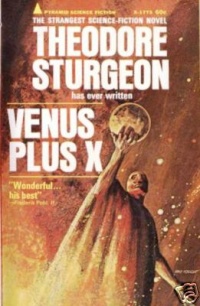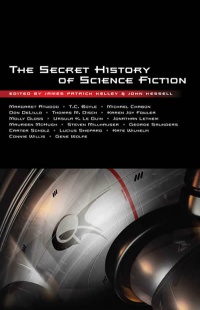You cannot be objective about it because you have been indoctrinated….. you come from a time and place in which the maleness of the male, and the femaleness of the female, and the importance of their difference, were matters of almost total preoccupation.
Title: Venus Plus X
Author: Theodore Sturgeon
Year: 1960
Rating: 2/5 stars
 On the front of my vintage paperback copy of Venus Plus X is the declaration: “the strangest science-fiction novel Theodore Sturgeon has ever written.” I can’t speak to the “-est” part (haven’t read enough of his work), but the rest of that statement is accurate enough; this is definitely a strange book. It’s a utopian story that focuses primarily on gender issues, viewing sexual differences and competition as the pivot on which society turns. Like many utopian novels, this one makes some good points here and there, but ultimately ends up being (a) unconvincing, and (b) a little bit creepy.
On the front of my vintage paperback copy of Venus Plus X is the declaration: “the strangest science-fiction novel Theodore Sturgeon has ever written.” I can’t speak to the “-est” part (haven’t read enough of his work), but the rest of that statement is accurate enough; this is definitely a strange book. It’s a utopian story that focuses primarily on gender issues, viewing sexual differences and competition as the pivot on which society turns. Like many utopian novels, this one makes some good points here and there, but ultimately ends up being (a) unconvincing, and (b) a little bit creepy.
When Charlie Johns wakes up in a world different from the one he’s familiar with, apparently the victim of a kidnapping-by-time-machine, he’s in for the shock of his life. No, it’s not the time machine itself, but the bizarre people and society to which it has brought him. He finds himself the guest of the Ledom, a new version of humanity that has only one gender, with male and female characteristics averaged into an androgynous middle ground. Any Ledom can mate with any other, but with the “battle of the sexes” out of the way, they do it without the sexual tensions and hangups of previous ages. The Ledom see this as an achievement of the highest order, and the basis of their perfect and blissful existence.
Of course no one can deny that sexual differences have played a huge role in human societies, and that there is such a thing as sexism, and that one gender has been disproportionately excluded from power throughout most of history. But I can’t buy Sturgeon’s premise that this is the primary source of all the ills in the human world, or the suggestion that if that problem could be eliminated, utopia would be the natural result. Of course I have no idea how seriously (if at all) Sturgeon meant the idea to be taken. But, when you discover this change to a one-gender system is not evolutionary at all, but artificial and quite purposeful, it really comes across as overkill, a radical solution to a problem that doesn’t require such an extreme. There is no recognition of the fact that progress has already been made, particularly in the 20th Century; hell, Sturgeon was alive (although a small child) when the 19th Amendment was ratified. But gender inequality is still the greatest evil facing society? I think that’s quite an exaggeration, even in 1960.
Sturgeon does make a valid point, however, about the human desire to feel superior, and the practice of making others inferior in order to accomplish this. He also has his Ledom address the fact that most people in the modern world are so disconnected from the land. Most people get their food not by picking it, growing it, or hunting it; we have specialists to produce it, while we play other specialized roles in a vast and complicated machine. Sturgeon points out that if that machine were ever to break, a whole lot of people would find themselves going hungry very quickly. I think that point was at least as interesting, possibly more so, than the book’s ideas on gender.
This is a highly readable novel, with an easy flowing prose style and a rather short length. And it does raise some ideas worth thinking about. But ultimately it comes across as a little preachy in tone, and doesn’t say anything nearly as deep as Sturgeon probably hoped for.














